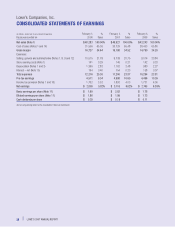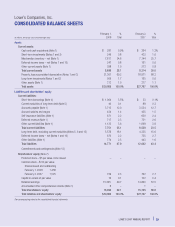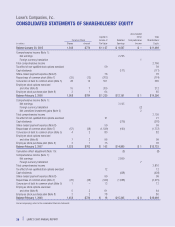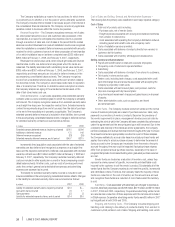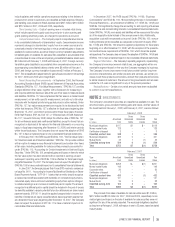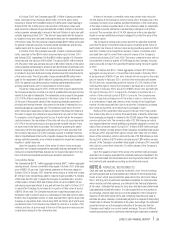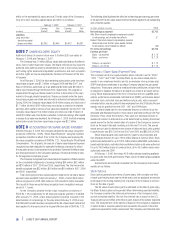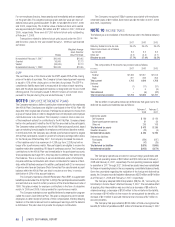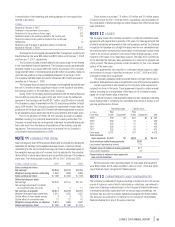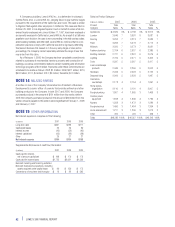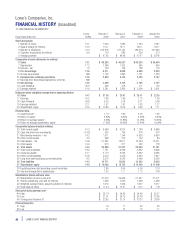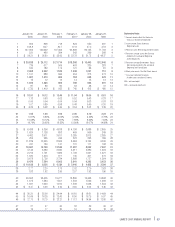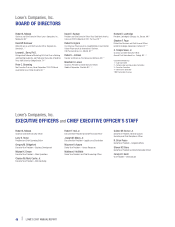Lowe's 2007 Annual Report Download - page 40
Download and view the complete annual report
Please find page 40 of the 2007 Lowe's annual report below. You can navigate through the pages in the report by either clicking on the pages listed below, or by using the keyword search tool below to find specific information within the annual report.
38 |LOWE’S 2007 ANNUAL REPORT
effect on the estimated fair value amounts. The fair value of the Company’s
long-term debt, excluding capital leases and other, is as follows:
February 1, 2008 February 2, 2007
Carrying Fair Carrying Fair
(In millions) Amount Value Amount Value
Liabilities:
Long-term debt
(excluding capital
leases and other) $5,245 $5,406 $4,013 $4,301
NOTE 7 SHAREHOLDERS’ EQUITY
Authorized shares of common stock were 5.6 billion ($.50 par value) at
February 1, 2008 and February 2, 2007.
The Company has 5.0 million ($5 par value) authorized shares of preferred
stock, none of which have been issued. The Board of Directors may issue the
preferred stock (without action by shareholders) in one or more series, having
such voting rights, dividend and liquidation preferences, and such conversion
and other rights as may be designated by the Board of Directors at the time
of issuance.
As of February 3, 2006, the total remaining authorization under the share
repurchase program was $1.2 billion. In August 2006 and May 2007, the
Board of Directors authorized up to an additional $2 billion and $3 billion in
share repurchases through 2008 and 2009, respectively. This program is
implemented through purchases made from time to time either in the open
market or through private transactions. Shares purchased under the share
repurchase program are retired and returned to authorized and unissued status.
During 2006, the Company repurchased 56.8 million shares at a total cost of
$1.7 billion (of which $160 million was recorded as a reduction in retained
earnings, after capital in excess of par value was depleted). During 2007, the
Company repurchased 76.4 million shares at a total cost of $2.3 billion (of
which $1.9 billion was recorded as a reduction in retained earnings,after capital
in excess of par value was depleted).As of February 1,2008,the total remaining
authorization under the share repurchase program was $2.2 billion.
NOTE 8 ACCOUNTING FOR SHARE-BASED PAYMENT
Effective February 4, 2006, the Company adopted the fair value recognition
provisions of SFAS No. 123(R), “Share-Based Payment,” using the modified-
prospective-transition method. Prior to this, the Company was applying the
fair value recognition provisions of SFAS No. 123,“Accounting for Stock Based
Compensation.” For all grants, the amount of share-based payment expense
recognized has been adjusted for estimated forfeitures of awards for which
the requisite service is not expected to be provided.Estimated forfeiture rates
are developed based on the Company’s analysis of historical forfeiture data
for homogeneous employee groups.
The Company recognized share-based payment expense in SG&A expense
on the consolidated statements of earnings totaling $99 million, $62 million
and $76 million in 2007, 2006 and 2005, respectively. The total income tax
benefit recognized was $32 million, $18 million and $19 million in 2007, 2006
and 2005, respectively.
Total unrecognized share-based payment expense for all share-based
payment plans was $92 million at February 1, 2008, of which $52 million
will be recognized in 2008, $30 million in 2009 and $10 million thereafter.
This results in these amounts being recognized over a weighted-average
period of 1.1 years.
As the Company adopted the fair-value recognition provisions of
SFAS No. 123 prospectively for all employee awards granted or modified
after January 31, 2003, share-based payment expense included in the
determination of net earnings for the year ended February 3, 2006 is less
than that which would have been recognized if the fair-value-based method had
been applied to all awards since the original effective date of SFAS No. 123.
The following table illustrates the effect on net earnings and earnings per share
in the period if the fair-value-based method had been applied to all outstanding
and unvested awards.
(In millions, except per share data) 2005
Net earnings as reported $2,765
Add: Stock-based compensation expense included
in net earnings, net of related tax effects 57
Deduct: Total stock-based compensation expense
determined under the fair-value-based method
for all awards, net of related tax effects (59)
Pro forma net earnings $2,763
Earnings per share:
Basic – as reported $ 1.78
Basic – pro forma $ 1.78
Diluted – as reported $ 1.73
Diluted – pro forma $ 1.73
Overview of Share-Based Payment Plans
The Company has (a) four equity incentive plans, referred to as the “2006,”
“2001,” “1997” and “1994” Incentive Plans, (b) one share-based plan for
awards to non-employee directors and (c) an employee stock purchase plan
(ESPP) that allows employees to purchase Company shares through payroll
deductions. These plans contain a nondiscretionary antidilution provision that
is designed to equalize the value of an award as a result of an equity restruc-
turing. Share-based awards in the form of incentive and non-qualified stock
options, performance accelerated restricted stock (PARS),performance-based
restricted stock, restricted stock and deferred stock units, which represent
nonvested stock, may be granted to key employees from the 2006 plan.No new
awards may be granted from the 2001, 1997 and 1994 plans.
The share-based plan for non-employee directors is referred to as the
Amended and Restated Directors’ Stock Option and Deferred Stock Unit Plan
(Directors’ Plan). Under the Directors’ Plan, each non-employee Director is
awarded a number of deferred stock units determined by dividing the annual
award amount by the fair market value of a share of the Company’s common
stock on the award date and rounding up to the next 100 units. The annual
award amount used to determine the number of deferred stock units granted
to each director was $115,000 in both 2007 and 2006, and $85,000 in 2005.
Share-based awards were authorized for grant to key employees and
non-employee directors for up to 169.0 million shares of common stock. Stock
options were authorized for up to 129.2 million shares,while PARS, performance-
based restricted stock, restricted stock and deferred stock units were authorized
for up to 39.8 million shares of common stock. Up to 45.0 million shares were
authorized under the ESPP.
At February 1, 2008, there were 45.6 million shares remaining available
for grant under the 2006 and Directors’ Plans, and 22.9 million shares available
under the ESPP.
General terms and methods of valuation for the Company’s share-based
awards are as follows:
Stock Options
Stock options generally have terms of seven years, with normally one-third
of each grant vesting each year for three years, and are assigned an exercise
price equal to the closing market price of a share of the Company’s common
stock on the date of grant.
The fair value of each option grant is estimated on the date of grant using
the Black-Scholes option-pricing model.When determining expected volatility,
the Company considers the historical performance of the Company’s stock,
as well as implied volatility. The risk-free interest rate is based on the U.S.
Treasury yield curve in effect at the time of grant,based on the options’ expected
term. The expected term of the options is based on the Company’s evaluation
of option holders’ exercise patterns and represents the period of time that
options are expected to remain unexercised.The Company uses historical data


